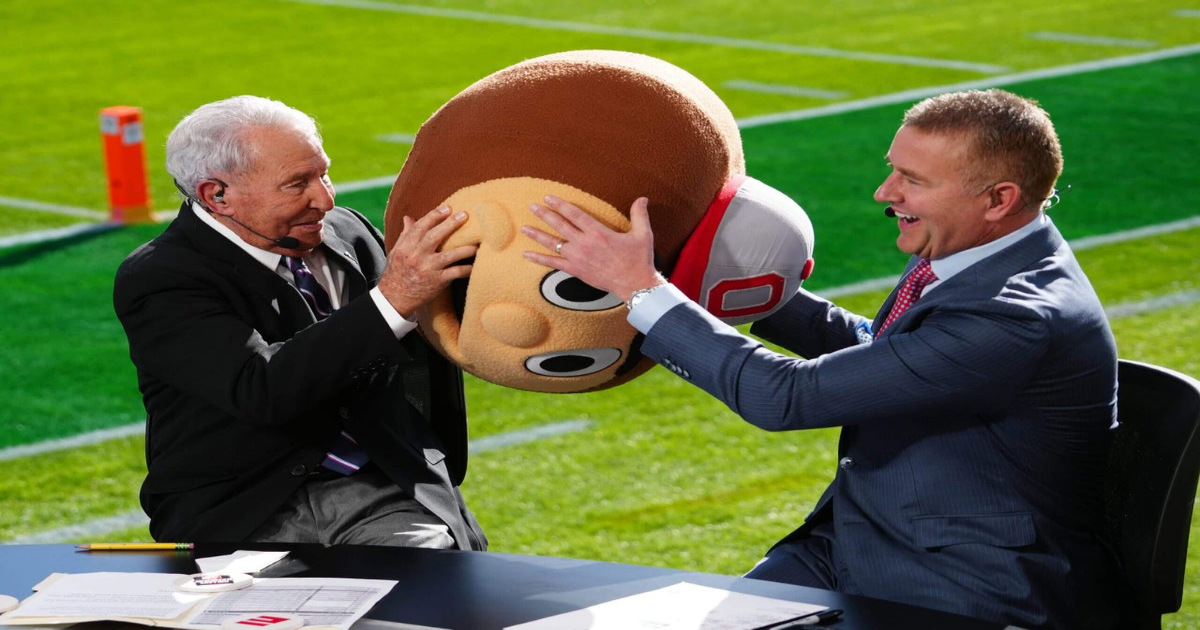The personalities who cut through in sports television are the ones who want to be at the games as much as you do.
Sometimes they even become part of the traditions of their sport as their enthusiasm transfixes an audience because their positivity for the event matches the fans who spend their whole week anticipating it.
That is why 89-year-old Lee Corso is being feted as he announces his retirement from ESPN’s iconic traveling TV road show, “College Football GameDay.” He loved those Saturdays as much as any alumnus.
After nearly four decades, Corso is scheduled to make his final GameDay appearance on Aug. 30, three weeks after his 90th birthday.
Corso’s ESPN career is expected to end with him putting on the headgear of the team he picks in front of the live audience. The fun gimmick is what Corso is most remembered for as a TV personality, but there was much more to his success.
Of the on-air personalities on the program, Corso has been the thread for the show as it became a part of college football Saturdays. Before Rece Davis hosted, Chris Fowler did. Before Kirk Herbstreit, Craig James was the authoritative analyst. There have been others: Mark May, Desmond Howard, Pat McAfee and Nick Saban. They have come and gone, while Corso has been the rock, even as he has taken a step back in recent years.
In 1987, when Corso was merely 52 years old, he was on the program when it debuted. ESPN was only eight years old, still finding its identity. The show did not go on the road for the first time until 1993. By 1995, it traveled full-time, vaulting — along with TNT’s Inside The NBA — into becoming arguably the top pregame show in sports over the ensuing decades. There were statistics and schtick.
In early October 1996 in Columbus, Ohio, Corso donned the Brutus Buckeye’s mascot headgear in picking Ohio State to beat Penn State. It transformed into a great weekly bit that ensured fans watched until the end of the program each Saturday.
It is not the reason Corso was a TV success, but it exemplified what TV executives many times miss with their on-air choices. Corso loved the sport, the camaraderie and the camera. He made millions, but he never came across as a mercenary.
Corso was good on the air. He wasn’t Charles Barkley, the best studio analyst of all time due to his playing career and wit. Corso coached in college for 15 years and lost much more than he won at Louisville, Indiana and Northern Illinois (73-85 overall record). He brought good spirit, almost like he was the first toast, on a day many fans planned to have one or two.
He studied the game, and you wanted to hear what he said, but it was more about how he said it. There was usually a small smile, as he didn’t take himself or the game too seriously.
Besides the predictions bit, his most memorable moments were when he good naturedly swore by mistake on air or had some sort of funny moment. Once with Olympic gold medalist Carl Lewis on set, Corso, all worked up, said, “Oh, f— it!” Fowler, Herbstreit and Fowler lost it, laughing.
The last few years have been a tad difficult for long-time fans to watch. The adage about taking away the keys from an aging parent applies. ESPN had a hard time managing it. Their hesitancy fully illuminates why Corso will be missed.
He wanted to be on site with GameDay as much as fans loved having him. That is why authenticity is the elusive trait in becoming a TV legend.
Over the more than four decades, as ESPN became a cultural phenomenon, it has had several personalities who grew as the network became a brand. For those associated with a particular sport, three stick out: Chris Berman led its NFL coverage. Dick Vitale owned college hoops. And Corso was that for college football.
They became the fabric of ESPN’s coverage with big personalities and passion to match any fan, coach or player. They connected.
During most weeks, after GameDay ended, Corso made his way to the sidelines of the game. With tens of thousands on hand, Corso was a sight unto himself, intensely watching, like he was the one coaching.
There was no one in the stadium more into it.
(Photo: Kirby Lee / USA Today Network via Imagn Images)
